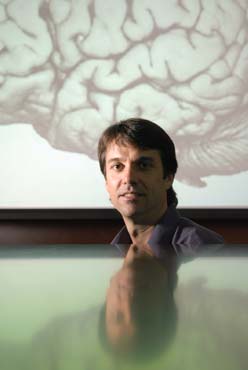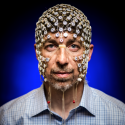Future angst? Brain scans show uncertainty fuels anxiety
Anyone who has spent a sleepless night anguishing over a possible job loss has experienced the central finding of a new brain scan study: Uncertainty makes a bad event feel even worse.

Jack Nitschke, a UW–Madison professor of psychiatry, has found that uncertainty intensifies a person’s perception of a bad experience.
Photo: Jeff Miller
A new study by UW–Madison brain researcher Jack Nitschke shows that the emotional centers in the brain respond much more strongly to disturbing photos if the person didn’t know what was coming.
“These results have obvious relevance to our current economic times,” says Nitschke, a professor of psychiatry in the UW–Madison School of Medicine and Public Health. “Expectations have a dramatic impact on many aspects of our lives, including performance at work and school, interpersonal relationships and health. Expectations can alter perceptions of negative events as well as neural and emotional responses.”
The study used functional magnetic resonance imaging (fMRI) to chart the reaction in two parts of the brain important for emotional responding: the insula and the amygdala. The study, published online Aug. 13 by the journal Cerebral Cortex, shows much stronger neural responses to negative stimuli when the event is preceded by uncertainty.
“This line of research is helping us understand how expectations influence our emotional responses to events,” Nitschke says.
For the study, 36 UW–Madison student volunteers had their brain activity charted in a fMRI machine at the UW–Madison Waisman Center. The students wore goggles that presented a series of pictures that were either neutral, such as a chair, or aversive, such as a badly wounded person. Before each image, the subject saw a symbol signaling one of three things about the image that would follow: a circle to show it would be neutral, an “X” to signal it would be disturbing or a question mark, which indicated uncertainty.
The insula and the amygdala both responded more strongly to the actual aversive picture if it was preceded by the question mark. Interestingly, those brain areas brain responded less strongly to aversive pictures if they received a cue warning that the disturbing picture was coming. Nitschke, a psychiatrist who treats people with anxiety disorders, says the results have clinical implications.
“If we can reduce people’s feelings of uncertainty, we can reduce their anxiety and their response to bad experiences,” Nitschke says. “Given that uncertain expectations are paramount in clinical and subclinical anxiety, these data suggest that more attention be paid to targeting those expectations in treatment.”
After the test, subjects were asked how often the question mark was followed by an aversive picture. While they saw an equal number of neutral and aversive photos, nearly 75 percent of subjects overestimated the frequency of aversive pictures following uncertain cues. The brain’s increased response to uncertainty explained these overestimations.
Nitschke’s co-authors are former and current members of his lab and include Issidoros Sarinopoulos, of Michigan State University; Daniel Grupe, of the UW–Madison departments of Psychiatry and Psychology; Kristen Mackiewicz of the University of Colorado; John Herrington of Children’s Hospital of Philadelphia; Mai Youa Lor of the Columbia University School of Social Work; and Eric Steege of West Virginia University.
An abstract of the paper can be found here, and the full paper will be published in the journal’s September edition.



